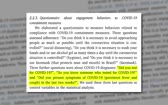Advertisement
The Pathologization of Dissent
James Corbett: Only Sociopaths Reject the New Normal! - #PropagandaWatch https://lbry.tv/@corbettreport:0/sociopath:0 8-25-20
- Category: Civil Disobedience /Resistance,Free Speech / First Amendment,Hoaxville USA / Psyop,Psyop, Psychological Operation
- Duration: 29:09
- Date: 2020-08-25 20:02:41
- Tags: no-tag
5 Comments
Video Transcript:
Welcome back friends. Welcome back to the Corbett Report. I am your host James Corbett of Corbettreports.com and you are tuned into Propaganda Watch. And this week I have some bad news for most of the Corbett Report audience, namely that if you are in any way against the idea of the containment measures that the unelected, unaccountable health authorities have declared are necessary to contain this dreaded scourge of COVID-19, then you are most likely a sociopath. At least according to the boffins from Brazil by way of the interpretation of places like Cypost.com where you may have seen the article recently, sociopathic traits linked to non-compliance with mask guidelines and other COVID-19 containment measures where they note that new research from Brazil has found that people who are unconcerned with adhering to measures to prevent the spread of COVID-19 tend to display higher levels of traits associated with anti-social personality disorder, also known as sociopathy. The findings have been published in the journal Personality and Individual Differences. On March 11, 2020, the World Health Organization declared the outbreak of the novel coronavirus SARS-CoV-2 to be a global pandemic. Governments around the world urged people to follow preventive health measures such as frequent handwashing and physical distancing, and oddly they failed to note in this article that at the time the health authorities at least in the US and in many other countries actively advocated against wearing masks. About that did change later on and then they said, oh don't worry, we were lying then, but we're telling you the truth now. So that's just a little part of that story that they don't include in this article for some reason, but it goes on to say that it is noticeable that compliance with containment measures varies greatly between people, said the authors of the new study. This is at least partially connected with psychological factors such as personality traits. So specifically, what is being referred to? It is an article published in the January 2021 edition of Personality and Individual Differences, which is available online now. Compliance with containment measures to the COVID-19 pandemic over time do anti-social traits matter. And there are a team of researchers from Brazil that worked on this, but ultimately they go on to talk about how they conducted a study of 1,578 Brazilian adults aged 18 to 73 years old, who answered facets from the PID-5, the effective resonance factor of the Acme, and a questionnaire about compliance with containment measures. So this is all self-reported from questionnaires, and they managed to piece together this conclusion. Our findings indicated that anti-social traits, especially lower levels of empathy and higher levels of callousness, deceitfulness, and risk-taking, are directly associated with lower compliance with containment measures. These traits explain, at least partially, the reason why people continue not adhering to the containment measures, even with increasing numbers of cases and deaths. Absolute BS. If you don't spot the scientific slide of hand that they just employed there, then you're not paying attention, but we will go through this in some more detail. I will invite you to look at the actual study itself. Don't take CyPost.com or some other commentators word for it, actually read the study so that you know precisely what these researchers did and precisely what they are claiming based on that quote-unquote evidence. And you will discover in their methodology section that they were, for example, giving a self-reported test on personality inventory, as approved by the DSM-5. We all know about the diagnostic statistical manual, is that what it is? DSM-5, the latest iteration of the psychological Bible that's put out by the American Psychological Association, which I have talked about before more on which in a moment, but they also gave an effective and cognitive measure of empathy self-reported test. And then a questionnaire about engagement behaviors to COVID-19 with the following questions. One, do you think it is necessary to avoid approaching people as much as possible until the coronavirus situation is controlled? And then they include in brackets so that you know what they're talking about, social distancing. Number two, do you think it is necessary to wash your hands and or use alcohol gel as many times a day until the coronavirus situation is controlled? Again, I am assuming that since this questionnaire was delivered in Brazil, that this is originally in Portuguese, so I'm assuming the actual question they asked on the questionnaire was not grammatically incorrect as this question is, grammatically incorrect in a way as to make the question, if not meaningless, at least in determinant what it is actually asking. Do you think it is necessary to wash your hands and or use alcohol gel as many times a day until the coronavirus situation is controlled? What does that mean as many times a day until? Is not an actual question as many times a day as is as necessary until? I don't know again and what does that mean? How many times a day? Once, twice, three times every hour, every time you do such and such an action, again, it's such a meaningless question. And then three, do you think it is necessary to use face mask that protects nose and mouth in Brazil? Bracket face mask in case you didn't pick up on the keyword there. And then there were three further questions about diagnoses. Did you test for COVID-19? Do you know someone who tested for COVID-19? And did you present symptoms of COVID-19, i.e. fever, cough? I mean, just these general symptoms that 99% of the public has in any given year in the last two weeks. And then they go on to report their findings. And any guesses on how many of these 1,578 adults that were surveyed here actually, A, were tested for COVID-19, and B, reported a positive test. Well, the answer to A, out of 1,578 adults, questioned a grand total of 32 of them had taken the, as we know, from previous reports and other work that's being done at off-guardian.org and other places, the ultimately meaningless, likely PCR test for COVID-19. So 32 people had actually received such a test. And out of those 32 people, the grand total of five had received their positive or potentially false positive results. So there you go, five out of 1,578 of the people being surveyed. So again, let's go back to that conclusion that they come up with in there, that they put front and center in their abstract, because I think this is highly relevant. And it shows a slight of hand that they expect you not to notice. So they say that differences were sustained in the interaction with the containment measures in weeks separately, but not all acting together. Our findings indicated that anti-social traits, especially lower levels of empathy and higher levels of calisiveness, deceitfulness, and risk-taking, are directly associated with lower compliance with containment measures. So directly associated, in this case, means that according to this self-reported questionnaire and this test and these answers to these specific questions, the people who scored higher on this anti-social behavior score also tended to be less likely to comply with containment measures. That's the association. And then they say these traits explain at least partially the reason why people continue not adhering to the containment measures, even with increasing numbers of cases and death. No, no, no, no, no, no, this does not explain. This is correlation. This is not causation. You have to go a good deal further to discover causation. So one example of an alternative explanation as to the reason why people continue not adhering to containment measures might be because, for example, out of 1578 adults that you asked about this, a grand total of 32 of them had been tested and five of them had received a positive result. How many of those positive results were in the hospital in ICU on ventilators? I'm going to get ventured to get zero, but at any rate, probably not all of them. So out of this incredibly vast sample, you have a tiny sliver of a fraction of a percentage point of people who had even been tested, little on tested, tested positive for this illness. And people are supposed to be deathly afraid of this and rigidly adhering to all of the containment measures that they're told by the health authorities. And the only reason why they do not do that, the only possible explanation that we can possibly imagine as to why that is is because they are sociopaths. I think there are other alternative explanations. And here's the really baffling thing about this. And one of the important reasons why I do say that you should go and read this actual study highlights. There are there's this little info box of highlights of the study at the top of the page here. And the third highlight is of particular interest to me because it says quote, the increase in COVID-19 cases in the country are not associated with people's adherence to containment measures. What hold on, read that again, the increase in COVID-19 cases in the country are not associated with people's adherence to containment measures. Wait, what is that saying? I believe I am interpreting that statement. And perhaps I am misinterpreting, but I again, perhaps English is not these researchers first language. So perhaps they are incapable of saying what they're trying to say. But it certainly sounds like they are saying there is no correlation between adherence to containment measures and the increase in COVID-19 cases. I.e. the containment measures are not proven to actually do anything. Now, the strange thing about this is I have had a glass through this study and I do not see anywhere in this study where that particular highlight is actually discussed. So again, I invite you to go and read through this. If you can find what that precisely is referring to in this study, please do so. And please point it out to us in the comment section at corporate report.com because that doesn't make any sense, especially in terms of the study itself. Again, the only reason why people might not comply with these containment measures is because they're sociopaths. Oh, and by the way, this is the containment measures aren't associated with aren't in any way correlated to the increasing numbers of cases. What? What? Again, it's statements like these that don't seem on their face to make any sense and then unwarranted leaps that are then unquestioningly and unproblematically reported by CyPost.org and other such websites. So there's a lot going on here. But I will actually direct you to the science subreddit where as you would expect, all of the top comments are all about, oh these damn anti-maskers, they're all sociopaths, but we already knew that these are horrible, deceitful, risk-taking people that don't care about, they don't have any human empathy blah, blah, blah. But if you actually scroll all the way down and click to load more comments and scroll all the way down and scroll about as far as you can go, you start getting into some comments that are actually worth reading, including ones that call into question some of the very basic premises of the study. For example, uh, poke belabie has this comment, not sure I agree with this headline and consideration of the study. Three questions assessed adherence. Do you think it's necessary to avoid approaching people as much as possible? Do you think it's necessary to wash your hands and or use alcohol gel as many times a day? Do you think it is necessary to use face mask? These questions all ask the participant their opinion. They do not ask the participant what they have or will do in the future. An individual can disagree with the merits or necessity of a policy and still follow that policy, either through the weight of government mandate or public peer pressure, reading this study I think the headline should switch non-compliance with disagreement. So that's that's one valid point about the way they are interpreting the results of this question error. Um, uh, uh, uh, um, uh, um, uh, um, uh, uh, uh, uh, uh, uh, um, uh, uh, uh, uh, uh, uh, um, uh, uh, uh, uh, uh, uh, uh, uh, uh, uh, uh, uh,omaniao2, uh, uh, uh, uh, uh, uh, uh, uh, uh, uh contrario to the highlights also from the study. The increase in COVID-19 cases in the country did not seem to be associated with people's adherence to the containment measures. So what's the point of the containment measures? Uh, uh, uh, uh, uh, uh, uh, uh, uh, uh, uh, uh, uh, uh, uh, uh, uh, uh, uh, uh, uh, uh, uh, uh, uh, uh, uh, uh, uh,izada. Notes are squared values are extremely low. Um, and uh, again, there are some other, the fallacy here is their failure to address the obvious sociopaths tend to be non-compliant in general. Well, there you go. Sociopathic is not an academic term. More importantly, it is not the same thing as anti-social PD, shame on this website for using them interchangeably. Um, again, more people pointing out that this is correlation, not causation. Uh, there's actually some pushback in the comments in, uh, again, buried way down at the bottom once you get past the circle jerk at the top. Uh, but it does show that there is some degree of critical thinking and skepticism going on with regards to studies like these and that no, you are not necessarily a sociopath because you dare to question the, uh, rules and guidelines set down by the unelected, unaccountable health authorities that, oh, by the way, are sometimes lying to you for your own good as Fauci and others have admitted and as of I have played on the Corbure Report here, uh, in the recent past. So let's address the bigger question and the bigger problem here because this does actually present a potential nightmare scenario that is laid out in this article itself where the researchers in the scientific article or the researchers say that our findings can be used for public health policies. For example, through screenings that demonstrate an elevation in these traits, interventions can be carried out aiming at greater awareness and consequent compliance with containment measures. We suggest that further studies be carried out investigating the interaction of these traits with other variables. Now, if you read that paragraph and shivers did not go down your spine, then either they have succeeded in cloaking their, the horrific nature of what they're proposing there in suitably academic jargony, uh, cushy language that doesn't feel so particularly, uh, pointed or you are not paying attention because what is being said there is that well, if the public health authorities in the new biosecurity paradigm start implementing screenings for these sociopathic traits and we identify you as one of these non-compliant individuals and we could take certain interventions to make sure that you comply or are more likely to comply with these containment measures for your icky organic body. Now, again, there is a long and very disturbing history to this type of psychological intervention for political dissent because make no mistake, what is happening right now is the politicization of certain behaviors and if you are a political dissident, you are now a psychologically challenged individual. This is called the pathologization of dissent. They are trying to take political dissent and make it into a psychological disorder and there is a long and as I say disturbing history to this, this is not coming out of nowhere. For example, it is well documented because in the freedom-loving west led by the US as the shining beacon on the hill, it's okay to criticize the enemy, the menace. So for example, there is a lot of literature on how the Soviet Union pathologized political dissent and you can read up on the psychoshka's, uh, the psychiatric hospitals where political dissidents were imprisoned on the basis of having been pathologized as being mentally insane because they dared to question authority, uh, where the money quote, uh, ideas about a struggle for truth and justice are formed by personalities with a paranoid structure according to the Serbsky Institute professors, back in the old Soviet system. So yes, we can see quite obviously from that example, again, well documented because the Red Boogieman, well, yes, they did do horrible horrific things to political dissidents in the Soviet Union or the, the latest iteration of the Red Menace, the Red Scar is of course China. So we have a plethora of information about the very real and very horrible things that China does to its own political dissidents. Also, uh, in the name of psychiatric care, uh, essentially path pathologizing again political dissent or counter revolutionary thought in the Maoist system that of course was taken over by Deng Xiaoping and his various successors right through to Xi Jinping. It continues to this day and there's again a long and well documented history of this, uh, for example, Robin Monroe has written on this, uh, subject and uh, it's been covered by human rights watch and other organizations like that that are perfectly fine with talking about abuses. Well, over there, not so much over here, but of course the over here is exceptionally important as well and has been documented here and there. For example, you will recall that I have talked about on propaganda watch before the idea of, uh, psychologists having been important in implementing the torture program that the CIA used in the wake of 9-11 and which was exposed years down the road, years later, but yes, psychologists were employed to strengthen, uh, the measures that were taken in the CIA torture program and that has been covered here. And therefore, example, physicians for human rights had a report on aiding torture in 2009 that covered some of the human rights violations that were demonstrated in the May 2004 inspector's General's report on the CIA torture program. So, again, even what the US government itself admits to is the weaponization of psychology against dissidents. And if that term weaponization of psychology rings a bell for you. Well, then congratulations. You are a Corbett reporter and you will remember episode 98 of the Corbett Report Podcast where we talked about weaponized psychology and I highlighted the case of a 9-11 truth researcher in New Zealand who was, uh, referred to a psychiatric care against her will for having dared to question what happened on 9-11. Again, that was pathologization of dissent and this has its roots in, uh, establishment psych psychological practice right now. Something that I've been over on this program a couple of times with Dr. Bruce Levine, perhaps most notably back in interview 474 on the anti-authoritarian mind where we talked about the DSM-4, again the psychological, psychological Bible as it's called, and its pathologization of dissent under the guise of oppositional defiance disorder. If you're a child and you don't like to do what you're told at all times, you are an oppositional defiance disorder sufferer and I'm sure there are many medications that we can prescribe for you for that. Right? Again, the pathologization of dissent, it starts very early and is drummed into children so that they know by the time they are adults to comply and if you still don't comply with the mass guidelines or other then you are clearly a sociopath and don't worry public health officers will at some point in the future have screenings for people like you and will then be able to target you for more appropriate interventions to make sure that you comply with the guidelines and that can take many different forms but here's one very interesting proposal that may have crossed your radar recently, not least of which because I included it in this weekend's subscriber newsletter at CorbettReport.com but it is a article from a professor, an associate professor of medical ethics, i.e. a bioethicist, who I will not even bother to name by name because I think this is a clickbait article designed to generate controversy to generate more publicity for this particular professor but what he is saying in this article is chilling and I will provide the link if you are interested in reading it for yourself as always. This is from theconversation.com just posted up a couple of weeks ago, morality pills, maybe the US is best shot at ending the coronavirus pandemic according to one ethicist. Quote, COVID-19 is a collective risk. It threatens everyone and we all must cooperate to lower the chance that the coronavirus harms any one individual. Among other things that means keeping safe social distances and wearing masks but many people choose not to do these things making spread of infection more likely. He goes on to limit the tragedy of the commons. If everyone shares the same pasture for their individual flocks, some people are going to graze their animals longer or let them eat more than their fair share, ruining the commons in the process. So selfish and self-defeating behavior undermines the pursuit of something from which everyone can benefit such as the democratically enacted enforceable rules like mask wearing and social distancing, democratically enacted enforceable rules. What an interesting framing. And he goes on to say that my research in bioethics focuses on questions like how to induce those who are non-cooperative to get on board with doing what's best for the public good. To me, it seems the problem of coronavirus defectors could be solved by moral enhancement. Like receiving a vaccine to beef up your immune system, people could take a substance to boost their cooperative pro-social behavior. Could a psychoactive pill be the solution to the pandemic? Well, yes, he goes on to basically make the argument for that. Based completely around this total pseudoscientific nonsense about the idea of some pill that's going to deliver some sort of moral boost to you, make you more altruistic and more giving and more generous and more cooperative, as if that necessarily translates into you will wear a mask. Because again, the underlying premise of this is that wearing a mask or whatever, whatever rule they come up with, you have to touch your nose five times on Tuesday or whatever, whatever the health authorities say will protect you, you have to do. And you will do if you're an altruistic and giving a generous person. But wait, what if, for example, you have reason to believe that the social distancing guidelines that the health authorities are saying is total quackery that you truly believe it's absolute notary to do that. Or perhaps even if you believe that it is adverse to your health. If, for example, you have questions about the, say, experimental mRNA vaccine that they're going to unveil on the public in the next few months and they're going to say is the answered everything. If you have genuine concerns and questions about the health safety efficacy of such an intervention, such a treatment, does it make you sociopathic for refusing? It doesn't mean that if you took some sort of imaginary, which doesn't exist anyway, morality, pill to boost your, your cooperativeness and your generosity that that would make you then get the vaccine that you think doesn't have any basis in actually helping you. No, of course not. Again, this is all predicated on the absolutely completely stupid and gibberish notion that what the health authorities are arguing is what you believe and you know to be right and you know to be good, but you are not doing it because you you just don't care about other people. And again, assuming that there can be no other reason for not wanting to follow these guidelines other than that you are a sociopath. So again, I was going to say I don't think these people are arguing good faith. It actually doesn't matter. Perhaps they truly believe from the bottom of their heart that the only possible explanation for not believing the unelected, unaccountable health authorities and every pronouncement that they make even when they tell you that they have lied to you in the past. The only possible reason you could have for not believing them and not trusting them and not 100 percent going along with whatever they are saying today is because you were an sociopath. Maybe they really believe that, but I know anyone with two brain cells to rub together does not necessarily believe that. So I think this is an exceptionally important part of the biosecurity paradigm that we're sleepwalking into. The pathologization of descent. We have seen it in the past, as I say 9-11 truth research and other people who have questioned the pronouncements of authorities have certainly suffered the problems as a result of that in terms of being psychologized, having their their political dissent psychologized into a some sort of pathology. But that is going to be employed even more strenuously in this new paradigm, which is all about health anyway. And if you're not going to take one for the team and do something for the good of society, even if you do not believe that it is good, well, we will make you believe it is good one way or another, i.e. we will find excuses to drug you up in whatever way we think is necessary in order to make you want to receive the vaccine. And I should note that, of course, bioethics should not be a neutral sounding or even good sounding term in your ears. If you know the real history of that profession, if you do not, I will exhort you to read my recent article on from bioethics to from eugenics to bioethics, where I did talk about some of that history and some of the shady characters that are involved in bioethics trying to convince you of certain behavioral changes that this should be made for your own good, i.e. the good of the eugenicists. I will also once again direct you back to the actual article that this is stemming from compliance with containment measures to the COVID-19 pandemic over time. Do anti-social trace matter? Again, read it for yourself and come to your own conclusions about the conclusions that they come to. And while you're there, just as a little bonus, in the recommended articles sidebar, there is a link to an October 2020 edition of Personality and Individual Differences. An article in that edition is The Development and Initial Tests for the Psychometric Properties of the COVID-19 Fobia Scale, where they propose in the study a novel type of specific phobia, COVID-19 phobia, which is an interesting idea. And perhaps more based in reality than this idea that only sociopaths could be against Damascus guidelines and other such things. At any rate, we'll leave this exploration here for today, but obviously we'll be returning to this topic, I am sure, in the near future. But I will, as always, put all of these links in the show notes so that you can go and explore them for yourself. There's a lot of very important matters that are happening right now. This is one of them. I will, as always, be here examining them with you here at Corb. Report.com. I hope you'll be here to join me for that. Until next time, James Corbett, Corb. Report.com.










 Donate
Donate



